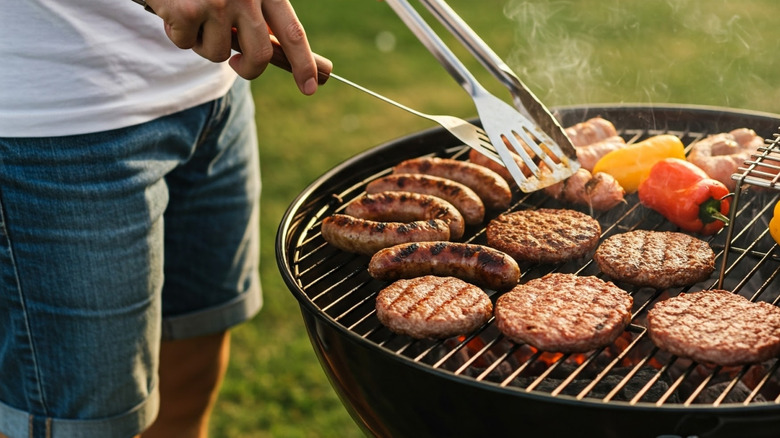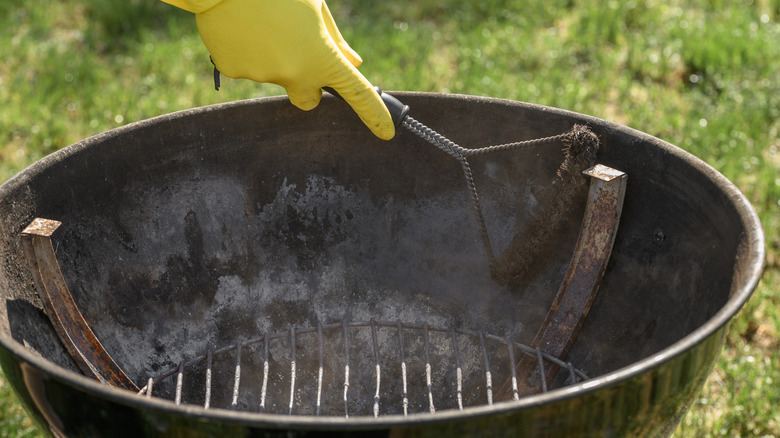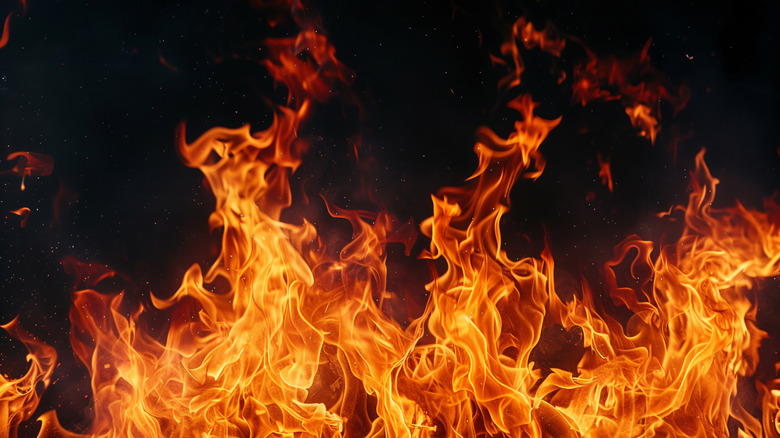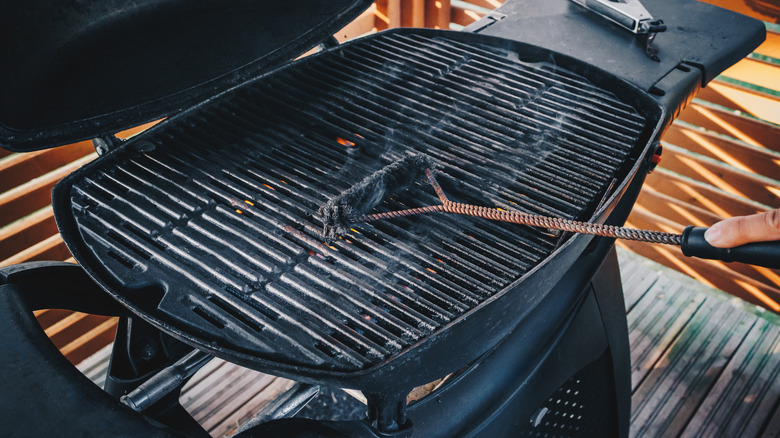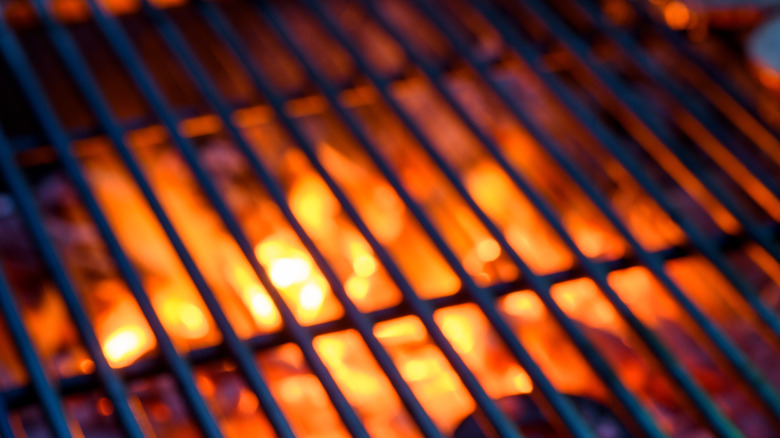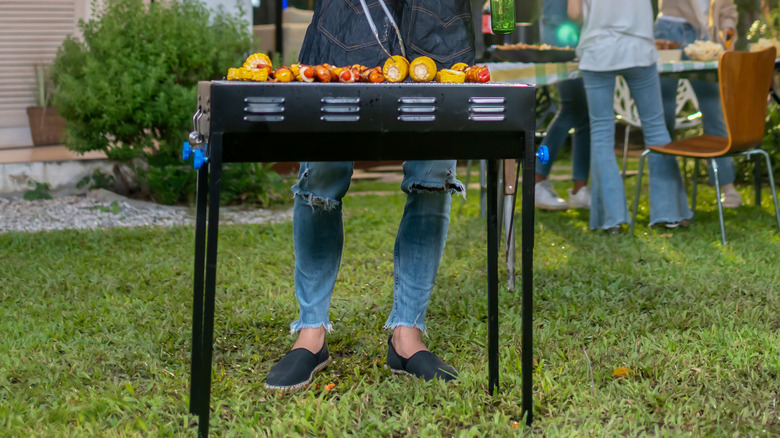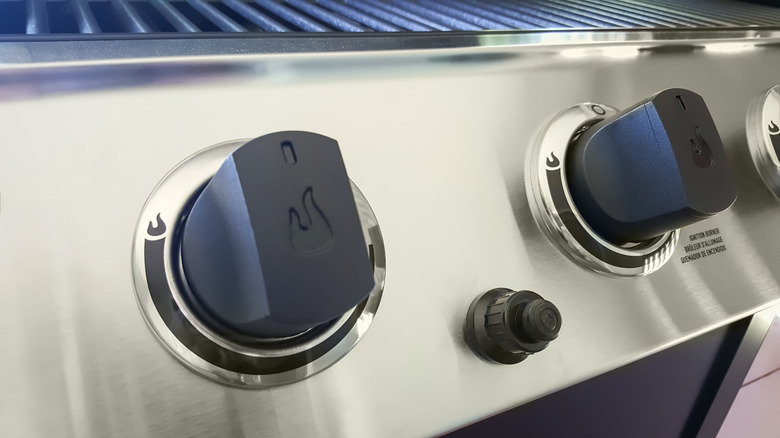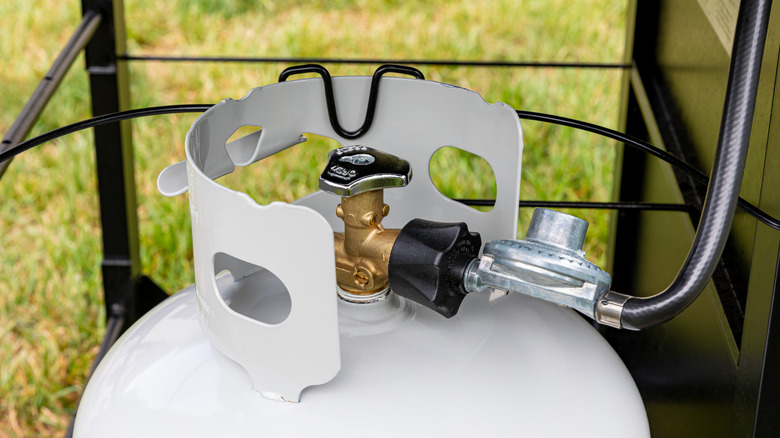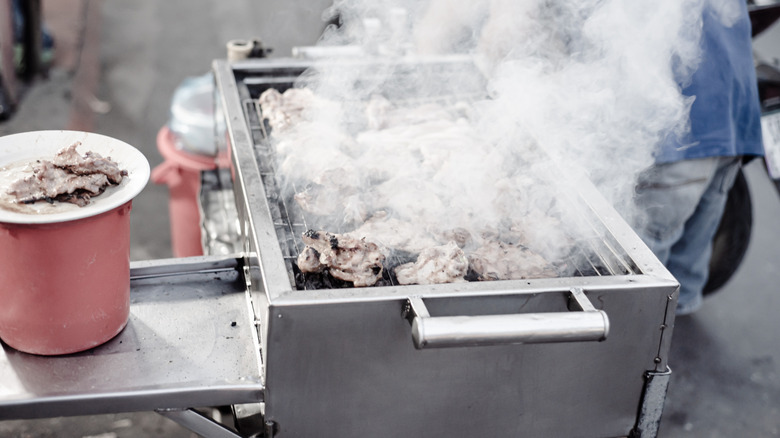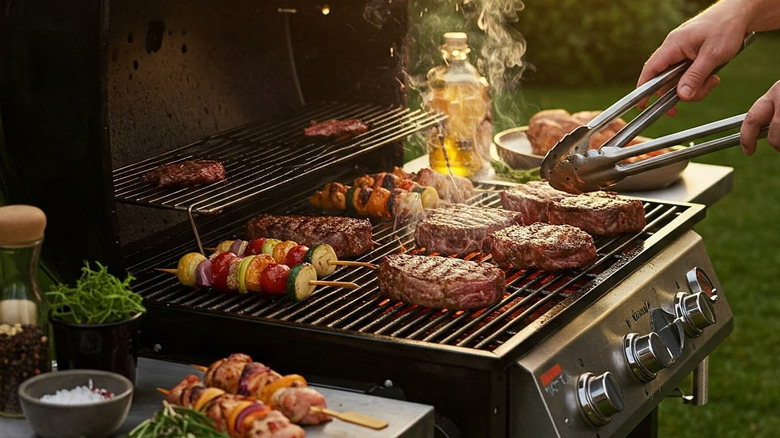The Tell-Tale Signs It's Time To Replace Your Grill
There's nothing quite like grilling season, whether that be home meals prepared and eaten outside, large family gatherings during the summer, or football parties during the slightly cooler fall months. The star of these events is, of course, the grill, and having a well-functioning one is crucial to your meal's success. But how do you know when your grill is ready to throw in the towel and quietly retire from making delicious steaks, hot dogs, hamburgers, and ribs?
During my fifteen years of food industry experience, I spent around six or seven of them behind an industrial open grill and about a year behind an industrial barrel grill. Plus, I've cooked for my family on a standard home grill (including propane, pellet, and charcoal) extensively over the last eighteen years. During this time, I've discovered the tell-tale signs it's time to replace your grill. Today, I get to share those signs with you so that a poorly working grill never ruins your special events. Ready to discover what those signs are? Let's get into it.
Damaged firebox
The firebox is the square or round bottom of your grill. In a pellet or charcoal grill, this is where the charcoal sits and burns. In gas grills, this might be where you add smoking wood or it may solely be the area containing your ignitors. Regardless of the type of grill you have, the firebox is a crucial part that ensures the food is cooked evenly and safely.
After years of use, the firebox can become dirty or damaged. This may manifest as rust, cracks, holes, or grease build-up. Rust is dangerous because it represents weak areas in your grill's firebox. If it's just a little bit, you may be able to clean it up and get away with it, but if the rust is anything beyond minor and superficial, it warrants a grill replacement. The same goes with grease build-up — a little bit can be cleaned away, but a lot of stuck-on stuff means your grill should be retired. Of course, any holes, cracks, or other obvious and extensive damage to the grill firebox also warrants replacement.
When any of these issues are present, the most obvious thing you'll notice is that the grill stops working properly. But, more importantly, these problems are really dangerous and lead to an increased fire hazard, as well as an increased burn risk.
Yellow or uneven flames
When you fire up your grill, you want to see even, bright blue flames that may or may not have yellow tips. This is the optimal set-up for evenly cooked steak, baked potatoes, and more. But, sometimes, your flames won't look like that. Instead, you may notice the flames are uneven or they may be completely yellow rather than just yellow-tipped.
Entirely yellow flames mean the fire isn't getting as hot as you want, and could signal a range of issues, including problems with combustion or air flow. It could also signal that there's a completely failed component in your grill, such as a bad regulator or burner. In turn, this can lead to unevenly cooked food, sooty tasting food, or even be a health hazard.
If you feel confident (and follow all safety measures), you could try cleaning your grill and all of its components to see if that helps. This may work if the issue is a mild build up of grease or debris along the bottom of your grill. However, if that doesn't work or you don't feel confident doing it, it's time for a new grill.
Weird smells
You should always be wary of weird smells coming from your grill because these could indicate serious and potentially life-threatening problems in some instances. Weird smells may be reminiscent of rotten eggs, excessive smoke, something rotting, or any unpleasant smell that you wouldn't normally expect. But, before we go into what these smells might indicate, it's important to understand that there is a singular exception to this, and that's when you first fire up a brand new grill. At this time, it's normal for there to be a strange, slightly artificial smell as all the manufacturing chemicals and greases burn off.
That being said, different smells generally mean different issues. For example, if you smell rotten eggs, it could be a natural gas leak. Make sure the natural gas is turned off and don't ever ignite when you smell this because it could lead to a large fireball inside of the grill. Instead, open the top of the grill to disperse the gas and step away. If it persists, you may need to call the fire station for a natural gas leak in the grill, which increases the risk of combustion.
Less dangerous smells include rotting, which generally indicates food or debris were left behind for some time, and excessive smoke, which usually means you need to clean your grill. If there's ever a funny smell that just doesn't go away despite appropriate efforts, it's best to be safe and replace the grill.
Excessive rust
We briefly discussed excessive rust in the firebox being a problem, but this issue is so common and can be so widespread that it deserves a mention of its own. Besides the firebox, rust can take over any part of your grill that's metal, from the grates and the lid to the legs or side burners. Depending on what part is rusty, it can lead to rust particles in your food, and nobody wants rust to ruin their otherwise perfect barbecue chicken. Plus, this can also be an increased fire hazard, increased burn risk, or more.
There are some parts you may be able to replace if they're excessively rusty but the rest of your grill looks fine. For example, a rusty grate in an otherwise stable grill can often be replaced with a new one affordably and easily. However, if it's the firebox, legs, or lid, you'll likely need to replace the whole grill.
But how do you know if rust is excessive or just superficial? If you take a wire brush or sponge and gently rub it along the rust with warm, soapy water, superficial rust will come off and you won't notice any visual difference in the grill. But, if it's excessive, the rust will come off and leave holes, cracks, or other imperfections behind.
Wobbling of Any Kind
Any type of wobbling needs to be addressed immediately, and if it can't be fixed, you'll need a new grill. After all, you don't want anything filled with fire to be structurally unstable because then you run the risk of it falling over and either spreading fire to parts of your yard or causing serious burns to yourself and others.
One thing to check before throwing away your grill for wobbling is that the equipment is on stable ground. Occasionally, grills may tilt slightly or seem off balanced because they're on a bumpy, tiled, or otherwise uneven piece of ground. This should be the very first thing you check since it's the easiest to solve — just move the grill to somewhere more even and stable.
Outside of uneven ground, some other types of wobbling can be fixed. For example, some grills feature adjustable legs that may just need to be straightened. Others have wheels that might be easily replaced with a little technical know-how. However, broken legs and unstable joints can also cause wobbling, and these issues are both serious and generally unfixable.
Ignitor is starting to fail or work slowly
Your grill's ignitor is the button, dial, or switch that starts (or "ignites") the fire in your grill. It's crucial in gas grills because, without the ignitor, the gas won't combust and cook your meat. Unfortunately, there are many things that could go wrong with this important component over time.
An ignitor may be slow to combust, so that when you push it, it does nothing and makes no sound for a few seconds or as long as a minute. It could also get stuck clicking without ever actually igniting. These issues are most often simply caused by age, but it could also happen because of grease and debris build up around the ignition.
Ignitor problems are a big safety hazard, and also one of the best indicators it's time to replace your grill. When an ignitor fails to combust, the gas can continue building up inside your grill, so that when it does ignite, it causes a big fireball. This fireball will travel upwards and can strike you or others in the face, as well as catch fire to anything nearby.
Cracked hoses and connectors
Many modern grills will have a series of hoses and connectors that help it ignite, cook your food evenly, and maintain safety while doing so. But, sometimes these components will become cracked or develop holes in them. When this happens, it can lead to gas leaks, which are (as we've already briefly touched on) very dangerous. These types of problems can also lead to a grill that no longer works. On some grill models, hoses themselves can be replaced. However, on other models, this issue will warrant complete replacement of your grill.
Cracked hoses and connectors can happen due to many reasons, but most commonly occur due to old age — they just naturally wear out over time. Sometimes, animals may get to the hoses and chew or scratch them, or an accident may occur that damages the hoses. If you store your grill outside (even under a tarp or cloth covering), the weather elements can cause aging damage to happen quicker. For this reason, it's recommended to store your grill in a shed or garage if you wish to prolong its usable lifespan as long as possible.
Maintenance bills are piling up
No matter how long you've had your grill, how expensive it was initially, or how fond you've become of it, there will eventually come a time where it needs to be replaced. And, one of the biggest indicators that your grill is ready to throw in the towel is that the maintenance bills are starting to pile up. If the costs to keep your grill running are starting to close in on the costs of purchasing a new one, it's time to cut your losses.
When looking for a new grill, consider your needs and preferences first. Do you prefer a gas grill or charcoal? Do you want a flat top grill or a grate with smoker capabilities? How large do you need your new grill to be to keep up with your intended usage? What features can you not do without and which would be nice to have? Once you answer these questions for yourself, browse current models that fit your ideal specifications and look for those with the highest ratings within your price range. And, FYI, if you're looking for the type of grill that's easiest to clean, it's a charcoal grill.
You want features your current grill doesn't have
It isn't always damage or problems that warrant replacing a grill with a new one. For example, it's okay to buy a new grill simply because you want an upgrade offering features your current grill doesn't have. This is especially true if your current grill is super basic, cheap, or outdated.
Modern grills can come with a plethora of useful features that you may wish to have in your own model. For example, one of the most common features are side burners, which are small chambers or sections attached to the main part of your grill. These side burners may offer a stovetop burner, a side smoker, or simply be a small extra space to grill other food items without risking contamination — perfect for when you need to cook up a meatless patty or alternative meal for someone with dietary restrictions or allergies. Other features include heavy-duty grates, electronic ignitors, fuel gauges, and adjustable-height cooking grates. Detachable ashpans, multiple dampers, and wheels to make the grill portable are also options. Keep in mind that the features available will depend on the type of grill you're looking for, whether that be gas, pellet, or charcoal.
